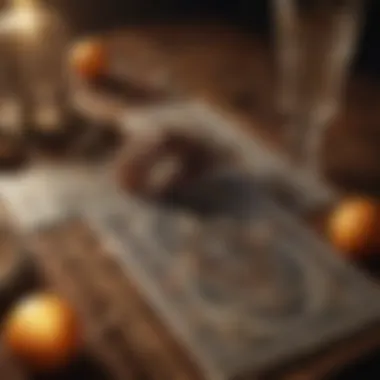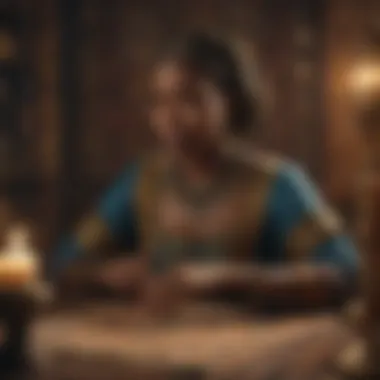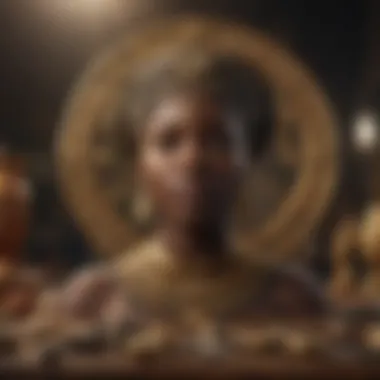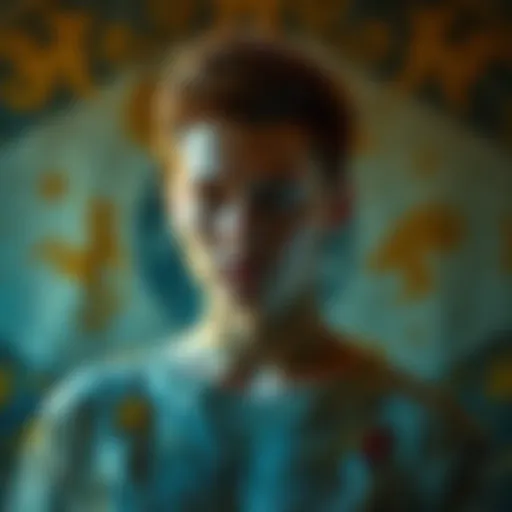Exploring African Tarot: Cultural Insights and Practices


Intro
African Tarot represents an intricate weave of cultural heritage and spiritual knowledge, deeply rooted in the mystical traditions of the continent. It goes beyond mere card readings, carving a unique space that combines traditional African beliefs and practices with the broader tarot narrative. This exploration is not just about the cards; it's about tapping into a rich history that nourishes both the mind and spirit.
Diving into the depths of African Tarot offers a chance to bridge worlds – where the ancient wisdom of ancestors meets modern interpretations. While tarot often conjures images of Western practices, African Tarot introduces varied symbols, stories, and philosophies that unveil a much richer tapestry. Communities throughout Africa bring their own interpretations, making each reading a distinct experience shaped by cultural nuances.
"In the hands of a skilled reader, tarot acts as a mirror reflecting the soul's journey, encouraging self-discovery and healing on many levels."
Understanding African Tarot means understanding the people behind it. The decks often feature local artwork, infusing each card with names and illustrations that resonate with familiar themes, beliefs, and experiences. This localization lends itself to interpretations that not only tap into personal meaning but also invoke communal narratives and shared histories. As we embark on this exploration, let’s consider how African Tarot functions as a guide leading us through personal and collective life's paths.
Preface to African Tarot
Understanding African Tarot invites us on a journey through the intertwined realms of culture, spirituality, and self-reflection. This exploration isn't merely about the cards; it's a deep dive into the rich tapestry of ancient wisdom that informs various African communities. African Tarot represents a unique worldview, tightly woven into the fabric of local traditions, beliefs, and practices. By mapping its origins and significance, we illustrate how tarot serves a formidable purpose beyond entertainment: it becomes a channel of ancestral guidance, self-awareness, and communal bonding.
Defining Tarot in the African Context
In the African context, tarot isn't just a card game or a commercialized tool for fortune-telling. Instead, it embodies a spiritually-loaded practice that resonates with age-old practices and beliefs. When we talk about tarot in African cultures, we’re referring to a system deeply influenced by the local philosophies, myths, and worldviews. This might mean incorporating elements from indigenous practices, oral histories, and even community rituals.
Take, for instance, the traditional card systems in West African nations, often rich with local symbols. Here, tarot is not seen as a static set of cards; it is dynamic, evolving with time and situation. Practitioners may utilize local imagery to convey messages pertinent to their communities. For them, these cards do not merely provide insights into personal dilemmas but open a portal to understanding broader social dynamics.
Difference Between African Tarot and Traditional Tarot
To grasp the difference between African Tarot and the more widely recognized traditional tarot, one must recognize the cultural underpinnings that shape each. Traditional tarot, like the Rider-Waite deck, often follows a fixed structure consisting of 78 cards, marked by universal meanings which have been interpreted and debated over centuries. However, African Tarot is versatile, reflecting the diverse heritage of the continent.
- Structure: While traditional tarot maintains its classic 78-card format, African interpretations may abandon this rigid structure or adapt it using localized iconography and narratives.
- Interpretation: In many African cultures, interpretations are often fluid, focusing on immediate community needs, perhaps differing profoundly from Western interpretations that may emphasize personal development or individualistic themes.
- Symbolic Resonance: Where Western tarot might lean on medieval European symbolism, African Tarot resonates with nature and local spiritual beliefs, often including motifs from daily life, animal behaviors, local flora, and tribal lore.
"The strength of African Tarot lies in its adaptability, reflecting a society that values collective wisdom over individual insight."
This distinction highlights a profound shift in how tarot can be approached—moving away from a one-size-fits-all mentality into a more inclusive, localized practice. This transformation allows African Tarot to act as both a tool for personal introspection and a harmonizing force within the community, thereby bridging gaps between generations and cultural identities.
Historical Perspectives
Understanding the historical context of African Tarot is crucial for appreciating its significance today. The evolution of tarot practices across the continent informs how various communities interpret and utilize tarot as a tool for insight and guidance. By examining the origins and the impact of colonialism, we can better understand how African Tarot has adapted over time, reflecting both resilience and creativity in merging traditional beliefs with contemporary practices.
Origins of Tarot in Africa
The roots of Tarot in Africa can be traced to diverse cultural practices. Before Western influence, various African societies utilized cards and symbols for divination and decision-making. For instance, traditional practices among the Yoruba people in Nigeria included using a form of divination called Ifá, leveraging a system of signs and symbols to connect with the spiritual world.
In this context, tarot cards did not emerge in isolation; they are part of a broader tapestry of spiritual practices that have long existed. Elements of storytelling, oral traditions, and spiritual connections with ancestors played pivotal roles in the way tarot came to develop in specific regions. Even today, many practices maintain a strong connection to ancestor veneration, tying the themes of tarot readings closely to the wisdom of those who came before us.
This blend of indigenous practices with tarot acknowledges the rich narratives rooted in Africa, offering a fuller picture of how tarot serves not just as entertainment, but as a means of connecting individuals to their heritage and identity.
Colonialism and Its Effects on Tarot Practices
Colonialism had a profound effect on spiritual and cultural practices across Africa. The introduction of Western ideologies and the suppression of indigenous belief systems disrupted traditional practices, including those related to tarot. Many African divination systems faced marginalization, pushed aside in favor of foreign beliefs. This clash of cultures forced communities to either abandon their ancestral methods or adapt them to fit a new context.
Despite these challenges, African Tarot began to incorporate aspects of colonial influence while also reclaiming and reinterpreting traditional elements. For example:
- Syncretism: Tarot often merged with local spiritual practices, resulting in unique interpretations that honored both aspects.
- Resistance and Resilience: Many communities developed secret societies that preserved tarot and other divination practices, maintaining the connection to their roots while navigating a colonized landscape.
- Revitalization: In modern times, as cultures sought to restore and celebrate their heritage, African Tarot saw a resurgence. Practitioners began to explore and integrate traditional symbols into tarot readings, signifying a reclaiming of spiritual narratives.
"The strength of African Tarot lies in its ability to evolve while remaining grounded in historical paradigm, reflecting both the pain of colonization and the joy of cultural revival."
Recognizing how colonialism influenced tarot practices reveals the complexity and depth of African spirituality. It highlights the constant intertwining of struggle and affirmation, illustrating that African Tarot is not a static tradition but one alive with historical relevance and contemporary significance.


Cultural Significance of Tarot
Understanding the cultural significance of tarot within the African context unveils a tapestry of beliefs and practices that transcend mere card reading. It's not just about predicting the future or seeking solace in uncertain times; African Tarot serves as a bridge connecting the past, present, and future. It inherently embodies communal ties, ancestral wisdom, and a framework for personal reflection.
In many African cultures, tarot cards are seen as vessels of communication with the spiritual realm. They are infused with meanings that resonate deeply with local narratives, traditions, and ethical values. Through the lens of tarot, individuals engage in introspection that encourages acknowledgment of personal struggles, aspirations, and the interconnectedness of all beings. The rituals associated with tarot reading often include offerings or invocations to spirits, which further roots the practice in spiritual significance.
Spirituality and Rituals in African Tarot
Spirituality in African Tarot extends beyond what meets the eye. Each card embodies not just symbols but stories rooted in tradition, mythology, and collective experience. For instance, a card representing change might draw from local tales where transformation symbolizes resilience and progress in community life. The rituals conducted often serve as both a preparation and an offering, establishing respect for the divine forces at play.
When engaging in tarot reading, practitioners may start with cleansing rituals, such as burning sage or incense, to purify the space. This act alone signals a readiness to commune with higher powers. Furthermore, the tarot's use in rituals is common; it can be part of celebrations, healing processes, and even funerals, emphasizing the cards' integral role in navigating life cycles.
Moreover, it is essential to emphasize the significance of intention behind the reading. Unlike a mere transactional approach of asking questions and receiving answers, African tarot readings are often more holistic in nature. They address the seeker’s past, present, and future in a way that encourages healing and growth, reinforcing the sense of community, ethics, and responsibility.
Role of Ancestors in Tarot Readings
Ancestors hold a sacred place in African cultures, and this reverence significantly shapes the tarot reading process. The spiritual connection to ancestry is a powerful aspect of African Tarot, where ancestors are not just figures of the past but active participants in the present. During tarot readings, invoking ancestors is common, where the reader seeks guidance and wisdom that transcends generations.
It is believed that the wisdom of ancestors can provide insights that lead to better decision-making and emotional clarity. Cards might represent ancestral spirits, guiding the seeker through their journey. The narratives that surround these cards often reflect the ethical teachings and cultural heritage passed down through generations.
The relationship between the seeker and their ancestors can influence the reading’s outcome. Seekers often ask for clarity on familial issues or personal dilemmas, tapping into the wisdom that only ancestors can provide. In doing so, the practice not only honors those who came before but also instills a sense of responsibility in the present.
Symbolism in African Tarot
The symbolism inherent in African Tarot not only enriches the practice of tarot reading but also reflects the deep-rooted cultural narratives and belief systems of various African communities. In the African context, symbols serve as bridges between the physical and spiritual realms, connecting users to their ancestry and the natural world. Understanding these symbols is crucial for anyone looking to explore the multidimensionality of their spiritual journey through tarot.
Common Symbols Used in African Tarot
The deck of African Tarot is often imbued with symbols that resonate with the traditions and history of specific cultures. Here are several prominent symbols:
- Ancestral Masks: Often depicted in various tarot illustrations, these masks represent the spirits of ancestors. They signify guidance, wisdom, and the need to pay homage to those who came before us.
- Adinkra Symbols: Originating from the Akan of Ghana, these symbols convey traditional wisdom and philosophies. For instance, the "Fawohodie" symbol represents independence and freedom, appealing particularly to those seeking personal growth.
- Baobab Tree: Known as the "Tree of Life", this tree is a potent symbol of strength and resilience. It reminds readers of their roots and the strength within their lineage.
- Sun and Moon: Representing duality and balance, these celestial bodies bring emphasis on the importance of contrasting forces in one's life—day and night, masculinity and femininity.
Each of these symbols carries its own meaning and significance, creating a rich tapestry of interpretation depending on the reader and the context of the reading.
Interpretation of Symbols Across Cultures
The interpretation of tarot symbols is rarely static; it varies significantly across different cultures, each layer adding depth to the understanding of the symbols. Take, for instance, the lion:
- In African Culture: The lion often symbolizes courage, power, and nobility, echoing its status as the "King of the Jungle." It serves as a reminder to embrace one's inner strength and leadership qualities.
- In Western Tarot: The lion may represent the attributes of Leo in astrology—confidence, passion, and artistry. However, it can also serve as a caution to avoid pride, depending on the context.
Drawing from these diverse interpretations enriches the reading experience. It encourages individuals to contemplate their own understanding of the symbols, weaving personal insights with cultural knowledge. This not only deepens one’s connection to the cards but also fosters a greater respect for the varied traditions that inform African Tarot.
"Symbols are the language of the universe, bridging the seen and the unseen. In African Tarot, they tell stories of the past while guiding us in the present."
The ability to draw parallels and contrasts among cultures signifies the universality of human experience. By grasping the complexities associated with symbols, practitioners can navigate their own spiritual paths with more awareness, respect, and understanding.
Different Schools of Thought
The exploration of African Tarot cannot be fully grasped without considering the different schools of thought within this rich tradition. This aspect is crucial as it allows one to appreciate the diverse methodologies and interpretations that exist across various communities in Africa. Understanding these schools offers invaluable insights into how cultural nuances shape practices, making each reading a unique experience.
Regional Variations in Tarot Practices
When delving into regional variations in tarot practices across Africa, one quickly realizes it is not a monolithic entity. Each community brings its own beliefs, traditions, and cultural influences, resulting in significant differences in how tarot is perceived and used.
For example, in West Africa, particularly among the Yoruba, tarot readings might be intertwined with the Ifá divination system, where practitioners incorporate a blend of symbols and stories specific to their deity, or Orisha. This creates a layered understanding where the tarot cards are not used in isolation but rather as tools among various belief systems.


In contrast, the Xhosa people in Southern Africa may employ tarot cards as a means of connecting with ancestral spirits, viewing the images not just as reflections of personal journeys, but as conduits for wisdom from those who came before. This distinct use highlights how cultural context can carve out unique tarot practices even within neighboring regions.
A few key points on regional variations include:
- Cultural Context: The local customs, languages, and histories play integral roles in shaping how tarot is interpreted.
- Subtle Symbolism: Each community may adapt traditional tarot imagery or incorporate unique symbols representative of their beliefs.
- Diviners’ Backgrounds: The personal journeys of tarot readers influence how they engage with the cards, further diversifying interpretation.
Overall, it’s clear that while tarot’s foundational aspects may resonate globally, the local flavors distinctly color its practice.
Modern Influences on African Tarot
As society evolves, so does the interpretation and application of African Tarot. Modern influences have ushered in new perspectives, intertwining contemporary thoughts with ancient traditions. These influences come from both within Africa and the broader global community, reshaping how tarot is viewed and utilized today.
The rise of digital technology stands out as a significant modern influence. Social media platforms such as Facebook and Reddit have become hubs for interconnected learning where tarot practitioners from across Africa share experiences and interpretations. This accessibility fosters a sense of community while allowing practitioners to learn from one another's regional practices.
Additionally, the growing interest in holistic approaches to wellness and spirituality has rekindled the public's fascination with tarot as a tool for self-discovery. As people seek more profound connections with their roots and heritage, African Tarot is increasingly viewed not merely as a divination tool but as a pathway to reclaiming ancestral wisdom and fostering personal growth.
In summary, the modern influences on African Tarot reflect a dialogue between the past and present:
- Interconnectivity: Online platforms facilitate a merging of ideas and practices among diverse tarot enthusiasts.
- Rebirth of Tradition: The revival of interest in traditional practices amidst contemporary lifestyles fosters a dynamic understanding of tarot.
- Personalization: Individuals are beginning to adapt tarot practices to fit their unique spiritual and personal requirements, enhancing its relevance in today's world.
Understanding the schools of thought regarding African Tarot reveals much about the cultural intricacies and the ongoing evolution that this practice is undergoing. By appreciating these nuances, one can better appreciate the richness of African Tarot as an ever-evolving tapestry of spirituality.
Practices and Methods
The practices and methods surrounding African Tarot are at the heart of its profound relevance within both individual and communal contexts. This section aims to unravel the intricate tapestry of techniques utilized during tarot readings, emphasizing how these methods serve not just as tools for divination but also as pathways to deeper spiritual connections. The grounding in cultural practices enhances the authenticity of readings, allowing practitioners and querents alike to engage more meaningfully with the cards and their messages.
How to Conduct an African Tarot Reading
Conducting an African Tarot reading involves a blend of intuition and methodology rooted in one's cultural background. Here’s a roadmap to guide practitioners:
- Choosing the Right Deck: Opt for a tarot deck that resonates with African symbolism and tradition. Decks such as the Afro-Brazilian Tarot or the African Tarot bring forth visuals and themes that speak to the rich heritage of African spirituality.
- Setting the Space: Create a sacred and comfortable environment for the reading. This can be anything from lighting candles, using incense, or even playing traditional African music softly in the background.
- Grounding Yourself: Before beginning, practitioners should engage in grounding exercises. This could involve deep breathing, meditation, or connecting with their ancestors through invocations or prayer.
- Shuffling the Cards: While shuffling, focus on the question or issue at hand—encouraging the energies of both the querent and the cards to align. It's vital to approach the shuffling with an open mind and heart.
- Layout and Spread: Utilize a spread that speaks to the question being asked. For example, the three-card spread (past, present, and future) is often beneficial for straightforward inquiries. However, more complex questions may require intricate layouts that delve deeper.
- Interpreting the Cards: This is where the rich cultural contexts come into play. Understanding the meanings of the cards through an African lens can bring unique insights. The practitioner should incorporate not only the standard meanings but also intuitive interpretations based on personal and cultural associations with the symbols.
As the reading unfolds, it’s essential for the practitioner to facilitate dialogue, allowing the querent to reflect and explore their own interpretations of the cards. This creates a collaborative space for understanding and growth.
Incorporating African Wisdom into Readings
Integrating African wisdom into tarot readings enriches the experience and deepens its significance. Here are ways to weave this ancient knowledge into modern practices:
- Utilizing Ancestral Teachings: Many African cultures place immense importance on the wisdom of ancestors. Practitioners can invoke this wisdom by sharing folklore, proverbs, and teachings that align with the cards drawn during the reading. This not only adds layers of meaning but also embeds cultural relevance.
- Embracing Nature: Nature plays a crucial role in African spirituality. Incorporating natural elements like stones, herbs, or even feathers can ground the reading. Each element can symbolize different aspects of life and serve as identifiers of the energies at play.
- Connecting with Spirits: Some practitioners choose to connect with spirit guides or deities pertinent to their cultural backgrounds. This can be done through ritualistic offerings or prayers that invite protective and guiding energies into the space.
- Reflecting on Personal Experiences: Encourage querents to reflect upon their own stories as they relate to the cards. The association between individual life experiences and collective cultural history can provide profound insights.
By merging traditional practices with contemporary understandings, African Tarot readings become more than just predictions; they transform into acts of spiritual connection and communal dialogue.
"True wisdom is like a river: it flows continuously and nourishes all it touches."
This approach concludes the reading with a sense of closure and understanding, ensuring that all participants feel enriched and enlightened.
Through these practices, African Tarot becomes not just a tool for insight, but a harmonic blend of heritage, spirituality, and personal awakening.
Challenges and Misconceptions
Exploring the realm of African Tarot brings forth a variety of challenges and misconceptions that need to be addressed with clarity. The complexity surrounding African Tarot requires understanding that it is rooted deeply in cultural traditions, spirituality, and distinct methodologies. Recognition of these aspects is crucial for both practitioners and enthusiasts as it helps cultivate a respectful and informed engagement with practices that may differ significantly from Western narratives.
Misconceptions about African Tarot often stem from stereotypes that oversimplify or misrepresent its practice. For instance, some people assume that tarot, in any form, is purely a tool for divination or fortune-telling. In the African context, however, Tarot serves as a medium for reflection, guidance, and connection to the ancestors. This distinct functionality is vital to appreciate, as it underscores the spiritual connection within the readings, rather than just a predictive tool.


By unearthing the societal stereotypes and examining their implications, we can illuminate how cultural boundaries are often blurred. Engaging thoughtfully with these challenges provides the opportunity to foster a greater appreciation for the depth and richness of African Tarot, setting aside preconceived notions that do not reflect its true essence.
Addressing Stereotypes Surrounding African Tarot
Stereotypes surrounding African Tarot often evoke images influenced by sensationalism and misinterpretation rather than cultural authenticity. Many innovations that characterize African Tarot practice are seen through a lens clouded by colonial history and misrepresentation. For example, individuals may view African Tarot through a Western-centric prism, where cards are exclusively linked to superstitions or pseudo-science. These perceptions undermine the profound cultural significance of Tarot as a tool for introspection and connection.
A significant stereotype involves the notion that African Tarot is simply a remnant of colonial mysticism. Contrary to this belief, the integration of tarot with African spiritual practices showcases a rich synergetic relationship, often honoring ancestral wisdom and traditions. Thus, it becomes important for individuals to debunk such myths, paving the way for genuine engagement.
Educating oneself about the diversified practices across many African cultures can dispel these stereotypes. For instance, exploring how different regions, such as Nigeria or South Africa, attribute distinct meanings to their cards offers illuminating insights. Tarot readings can encompass a wide range of themes, from personal growth to communal healing, highlighting their role as catalysts for constructive discourse.
Cultural Appropriation vs. Cultural Appreciation
In the dialogue surrounding African Tarot, the distinction between cultural appropriation and cultural appreciation emerges as a prominent concern. Cultural appropriation often exemplifies a one-sided taking, where elements from a culture, such as tarot practices, are adopted without acknowledgment or respect for the original context. This leads to trivialization and commodification of profound cultural symbols and rituals.
On the other hand, cultural appreciation involves understanding and valuing the history, significance, and context of practices like African Tarot. It requires a sensitivity to the narratives and beliefs of the practitioners and an ethical engagement with their rituals. Those who seek to integrate African Tarot into their lives should approach it through genuine learning and respect.
It is vital to foster dialogue about these themes, particularly within spaces where spiritual practices from various cultures intersect. Building awareness around local communities, their histories, and authentic practices is key. By doing this, practitioners can engage in a manner that reveres the tradition rather than stripping it of its significance. Ultimately, navigating the fine line between appropriation and appreciation is crucial for the sustainable future of African Tarot as part of the broader spiritual and cultural tapestry.
Future of African Tarot
The exploration of African Tarot offers a glimpse into the resilient and evolving practices that emerge from the continent's rich cultural tapestry. As we stand on the brink of a new era for African Tarot, it’s worth considering how contemporary shifts and technology are reshaping this ancient practice. A nuanced understanding of the future of African Tarot can provide both practitioners and enthusiasts with insights into how these traditions continue to develop.
Emerging Trends and Popularity
In recent years, there's been a notable increase in interest surrounding African Tarot, with more people seeking ways to reconnect with their cultural roots. This growing enthusiasm can be seen in various aspects:
- Awareness of Ancestral Knowledge: There’s a resurging interest among individuals who are keen to explore their heritage. They are discovering how tarot can serve as a bridge to their ancestors’ wisdom. This is not just a personal journey; it’s a communal resurgence.
- Fusion of Practices: Many are starting to blend African Tarot with other spiritual practices, creating unique interpretations that resonate with a broader audience. For instance, some practitioners combine elements of African spirituality with Western tarot traditions, enriching the readings.
- Workshops and Educational Programs: More people are offering workshops dedicated to African Tarot, filling a significant gap in the market. These programs aim to educate attendees on the historical and cultural significance of the cards, making it accessible to those unfamiliar with the practice.
“To understand the future of African Tarot is to engage with its past, recognizing the myriad influences that have woven it into the fabric of contemporary spirituality.”
The result of these trends is a more vibrant and expansive community that includes a diverse demographic, from seasoned practitioners to curious newcomers. This mix fosters an environment of shared learning and exploration.
The Role of Technology in Tarot Readings
The integration of technology into spiritual practices marks a significant shift in how tarot is perceived and performed today. Its implications for African Tarot specifically are noteworthy:
- Online Readings: Many practitioners now offer their services online, allowing individuals from different locations to access readings. This expands the reach of African Tarot beyond geographical boundaries, enabling more people to engage with the cards and their meanings.
- Digital Communities: Platforms like Reddit and Facebook have created spaces where tarot enthusiasts discuss, share, and critique various aspects of their practices. These communities foster connections across the globe, from indie tarot creators to seasoned readers, exchanging insights and personal stories.
- Mobile Applications: There are various apps emerging that focus specifically on tarot practices, some even dedicated to African Tarot. These tools can serve as guides for both novice and skilled practitioners, offering ease of access and portability that encourages deeper exploration.
Finale
The topic of African Tarot, as explored throughout this article, carries significant importance not just for scholars or spiritual seekers, but also for anyone looking to connect deeper with their cultural heritage. African Tarot is more than just a collection of cards or symbols; it embodies a fusion of history, spirituality, and tradition unique to the continent. It serves as a mirror reflecting both individual introspection and communal storytelling, emphasizing the interconnectedness of personal journeys and cultural wisdom.
Summarizing Key Insights
The discussion of African Tarot unravels several key insights:
- Cultural Depth: African Tarot is deeply embedded in the rich tapestry of indigenous beliefs and practices, setting it apart from conventional Tarot systems.
- Spiritual Dimensions: The practice transcends mere fortune-telling, functioning as a tool for spiritual connection and ancestral communication.
- Historic Context: Understanding the historical contexts, including colonial influences, aids in comprehending how these tarot practices have evolved.
- Symbolism and Interpretation: The symbols used in African Tarot extend beyond surface meanings, invoking layers of cultural significance that vary widely across different regions.
- Modern Adaptations: The integration of contemporary influences reveals a dynamic and evolving practice that remains relevant in today's world.
Incorporating African wisdom, whether through symbols or practices, proves beneficial for both readers and querents. It opens up avenues for self-discovery, community bonding, and appreciation of African heritage.
Reflecting on the Personal and Communal Impact of African Tarot
African Tarot stands as a symbol of resilience and revival for many communities. It bridges personal and collective experiences, allowing individuals to engage with ancestral knowledge in an intimate way. For instance, a reader might find their own life experiences interwoven with the narratives represented in the cards, creating a profound sense of belonging.
From a communal perspective, public readings or gatherings surrounding tarot practices can foster discussions about identity, history, and spirituality. They allow individuals to share stories and insights, reinforcing a sense of community. When practiced respectfully, African Tarot honors the ancestors, perpetuating their wisdom and teachings in our day-to-day lives.
As the interest in African Tarot continues to grow, it is vital to approach this journey with understanding and reverence. Whether one sees it as a spiritual practice, a cultural exploration, or both, the impact is undoubtedly significant—inviting deeper reflections on self, culture, and the universality of human experience.
In essence, African Tarot invites us into a space of connection—both with ourselves and the broader narratives of our heritage. Through its practice, we learn to navigate our journeys with guidance and wisdom passed down through generations.
By embracing this rich tradition, individuals can uncover the layers of meaning that African Tarot offers, allowing it to serve as a powerful tool for self-reflection and growth.



